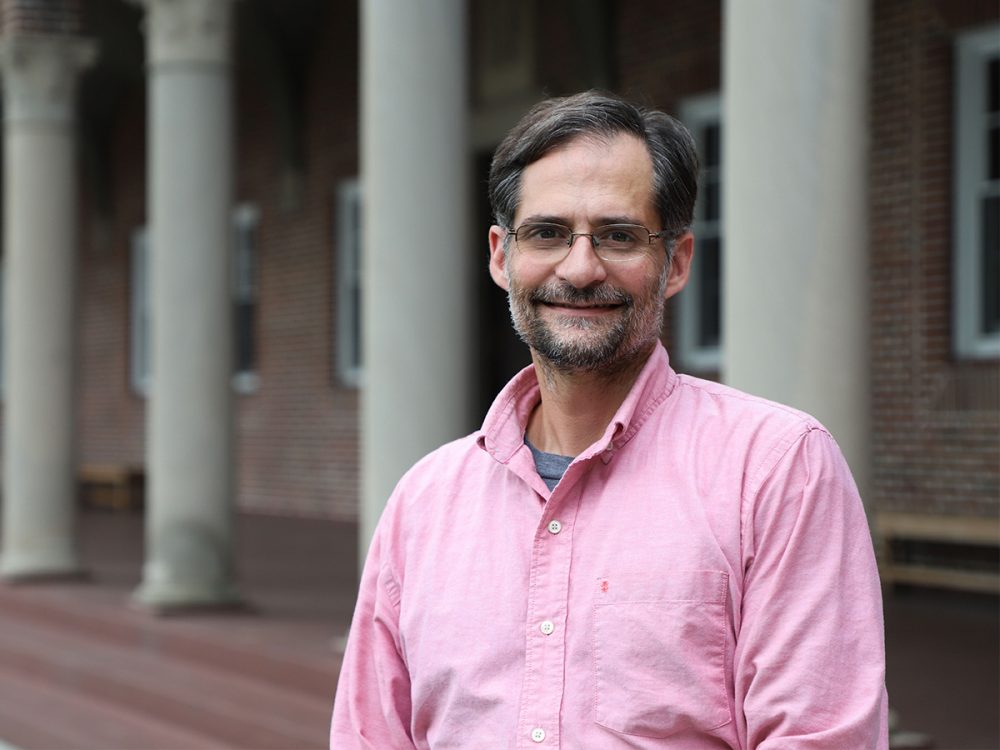During a series of riots in northern Iraq when the Arab Spring movement was breaking out, Jonathan Loopstra, Ph.D., would sit in bed listening to bullets go off at protests in a nearby bazaar. Each night he wondered if his students were involved in the gunfire.
By day, those students—Shia, Sunni, Christian, Armenian, Yezidi, and Turkish—would sit in his small Modern Middle History class at the American University of Iraq in Sulaimani debating issues of democracy, equity, and freedom.
A connection to the region
Loopstra’s connection to the region began years earlier when he joined the U.S. Navy. He served for six years as a naval nuclear mechanical engineer on the USS Carl Vinson (CVN 70) and saw several deployments to the Persian Gulf while serving on the ship.
The time he spent developing friendships and scholarly networks in northern Iraq provided the building blocks of a passionate study and deep knowledge of Middle Eastern history, culture, and languages.
“The blessing,” says Loopstra, “is that I can bring that knowledge and experience into conversation with my students in Western Civilization classes. I can talk firsthand about what it was like to be in the Persian Gulf during the sanctions period.”
A Northwestern alum
After completing his military service, Loopstra pursued an undergraduate degree at Northwestern. He graduated in 1999 and subsequently earned a seminary degree from Trinity Evangelical Divinity School in Illinois, an advanced master’s degree from Oxford University and, ultimately, a Ph.D. in Early Christian Studies at Catholic University of America in Washington, D.C.
Loopstra then helped start the American University of Iraq—the first liberal arts university in northern Iraq. He credits his time there with helping him understand the value of liberal arts. “I teach students from all majors,” he explains, “but because of the broad background of what we are teaching them in writing, reading, and critical thinking, they are now serving in many places around the world.”
Loopstra came to teach at Northwestern in the fall of 2016. Asked why an internationally known scholar would choose a small Midwest university, he replied, “I was impressed by the University of Northwestern—with the power of its emphasis on both the Bible and the history of Christianity.” Today he is professor of History and chair of Northwestern’s Department of History & Related Fields.
Speaking around the world
When not on campus, Loopstra can be found speaking in venues across the globe as a sought-after scholar in ancient Middle Eastern languages and culture.
He has been invited to participate on a panel of ancient language experts by the Institute for Advanced Study in Princeton, New Jersey, on multiple occasions. He also participates regularly in conferences in Europe and India.
At a conference in Paris, Loopstra spoke of his work on the Christian Syriac “Masora,” an ancient ninth-century teaching handbook for Bible recitation that predates our oldest complete codices of the Hebrew (Jewish) Bible, such as the Aleppo and Leningrad Masora manuscripts. Colleagues at the conference, which focused on the New Testament in the ancient Syriac tradition, were from Oxford, Cambridge, and other top universities.
Loopstra was also a featured speaker at the Library of Congress Symposium on “The Assyrian Christian, Past and Present” in 2016. There he presented a talk on “The Church of the East and the Transmission of Ancient Knowledge,” sharing why the fact that “Syriac-heritage Christian communities have always found themselves at the crossroads of cultures and at the periphery for the transmission of knowledge” is relevant to our society to this day.
Love for ancient manuscripts
Loopstra’s eyes shine brightest when discussing teaching and the significance of ancient Syriac texts. Syriac is a later dialect of the Aramaic that Jesus would have spoken. It was the common language spoken by Christians throughout the Middle East, all the way to China, during the period of the early church—before the coming of Islam.
Early Christians that spoke Syriac were heir to ancient Aramaic traditions of the East, and the inheritors of logic (Greek) and scientific (Arabic) thinking. These early Christians translated numerous words of ancient classic literature into Syriac (Aesop’s Fables and legends of Sinbad and Alexander the Great), chronicled major events of ancient history (the coming of the Mongols and the rise of the Islamic movement), and recorded traditions and histories of neighboring Christian communities (Byzantine, Armenian, Coptic, and Mar Thoma Indian). The early Syriac Christians also preserved key scientific and medical works by those considered fathers of their fields of study (e.g., scientific writings of Galen, the ancient Greek physician).
Perhaps the greatest significance of ancient Syriac is that many Bible translations, spiritual texts, and Christian texts were written in the language. Loopstra is using his knowledge of the ancient language to translate books of the Bible directly from Syriac, itself a very early witness to the Hebrew text of the Bible.
Parallels with today’s concerns
For Loopstra’s students, these texts hold foundational writings, discoveries, and theories in their fields of study—whether math, engineering, philosophy, law, history, health sciences, or literature. Gaining an understanding of these origins is invaluable.
Having access to Loopstra’s deep knowledge of ancient cultures and how our system of democracy, law, and freedom formed and developed is priceless today as young people in our society and across the world wrestle and debate these same issues societies have grappled with throughout history.

